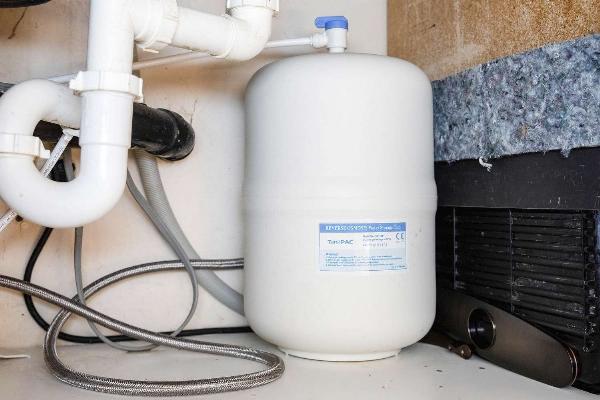Water Softeners 101: Common Myths and Misconceptions Debunked:

Strong 8k brings an ultra-HD IPTV experience to your living room and your pocket.
Water softeners are a popular solution for addressing hard water issues in homes, but there are many myths and misconceptions surrounding their use. In this comprehensive guide, we'll debunk some of the most common myths about water softeners and provide accurate information to help you make informed decisions about your water treatment needs.
Water Softeners Remove Essential Minerals:
One of the most widespread myths about water softeners is that they remove essential minerals from the water, leaving it devoid of beneficial nutrients. In reality, water softeners primarily target minerals like calcium and magnesium, which cause hardness and scale buildup in pipes and appliances. These minerals are not essential for human health, and their removal does not significantly impact the nutritional value of the water. Softened water can help improve the efficiency and lifespan of appliances by preventing mineral buildup.
Softened Water Tastes Salty:
Another common misconception is that softened water tastes salty due to the sodium ions used in the softening process. While it's true that water softeners replace calcium and magnesium ions with sodium ions through a process called ion exchange, the sodium content in softened water is typically very low and well below the recommended limits for daily sodium intake. Most people cannot detect any salty taste in softened water, and any perceived difference in taste is often due to the absence of mineral hardness.
Water Softeners Waste Water:
Some people believe that water softeners waste large amounts of water during the regeneration process, contributing to water scarcity and environmental concerns. While it's true that water softeners require water for regeneration, modern models are designed to operate efficiently and minimize water usage. Many newer water softeners use high-efficiency regeneration systems that consume less water and salt compared to older models. Additionally, the benefits of using softened water, such as reduced energy consumption and prolonging the lifespan of appliances, often outweigh the relatively small amount of water used for regeneration.
Water Softeners Are Expensive to Maintain:
Another misconception is that water softeners are expensive to maintain, requiring frequent salt refills and service calls. While there are some ongoing costs associated with maintaining a water softener, such as purchasing salt and occasionally replacing resin beads, these expenses are relatively minor compared to the long-term benefits of using softened water. With proper care and regular maintenance, a well-maintained water softener can last for many years without significant issues, making it a cost-effective investment in the long run.
Softened Water Feels Slippery:
Some people believe that softened water feels slippery or slimy on the skin, leading to concerns about cleanliness and hygiene. In reality, the slippery feeling often associated with softened water is due to the absence of mineral hardness, which can leave the skin feeling smooth and silky. While it may take some time to adjust to the sensation of softened water, there is no scientific evidence to suggest that it is any less clean or hygienic than hard water. In fact, many people prefer the feeling of softened water and find it more comfortable for bathing and showering.
Water Softeners Are Only Necessary for Well Water:
While it's true that well water often contains higher levels of mineral hardness compared to municipal water sources, hard water can be a problem in any area regardless of the water source. Municipal water supplies can also contain elevated levels of calcium and magnesium, especially in areas with limestone or other mineral-rich geological formations. As a result, water softeners can be beneficial for both well water and municipal water users, helping to improve water quality and prevent the negative effects of hardness on plumbing and appliances.
Water Softeners Require Electricity to Operate:
Some people mistakenly believe that water softeners require electricity to operate, leading to concerns about energy consumption and utility costs. While some models of water softeners do require electricity to power certain features, such as digital displays or programmable timers, many traditional water softeners operate using hydraulic power alone. These non-electric water softeners rely on water pressure to operate the regeneration cycle, making them more energy-efficient and cost-effective to run.
Water Softeners Can Remove Chlorine and Other Chemical Contaminants:
Although water softeners are effective at removing mineral hardness, they are not designed to remove chlorine or other chemical contaminants from water. To address chemical contaminants, such as chlorine, chloramines, or volatile organic compounds (VOCs), additional water treatment methods, such as activated carbon filtration or reverse osmosis, may be necessary. It's essential to choose the appropriate water treatment system based on the specific contaminants present in your water supply to ensure safe and clean drinking water.
Water Softeners Are Complicated to Install:
While the installation of a water softener may seem daunting to some homeowners, it is typically a straightforward process that can be completed with basic plumbing skills and tools. Many water softeners come with detailed installation instructions, and some models are designed for DIY installation without the need for professional assistance. However, if you're unsure about installing a water softener yourself, or if you encounter any difficulties during the installation process, it's always best to seek the help of a qualified plumber to ensure proper installation and operation.
Water Softeners Can Cause Corrosion in Plumbing Systems:
Contrary to popular belief, water softeners do not cause corrosion in plumbing systems. Water softeners can help prevent corrosion by removing mineral hardness and reducing the buildup of scale and deposits in pipes and fixtures. Hard water, on the other hand, can contribute to corrosion by promoting the formation of scale and mineral deposits, which can corrode pipes and damage plumbing components over time. By using a water softener to treat hard water, you can help protect your plumbing system and extend its lifespan.
Final Thoughts:
In conclusion, it's essential to separate fact from fiction when it comes to water softeners. By debunking common myths and misconceptions, we can better understand the benefits and limitations of these essential water treatment systems. Whether you're concerned about the taste of softened water, the environmental impact of water softeners, or the cost of maintenance, it's essential to consider accurate information and expert advice when making decisions about your water treatment needs. With the right knowledge and understanding, you can enjoy the benefits of softened water and ensure safe, clean drinking water for you and your family.
Note: IndiBlogHub features both user-submitted and editorial content. We do not verify third-party contributions. Read our Disclaimer and Privacy Policyfor details.




